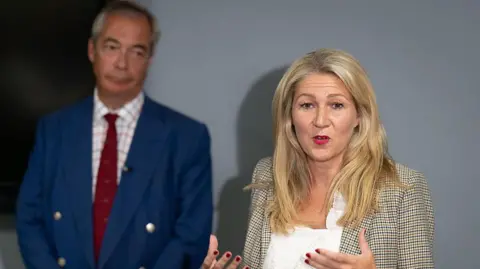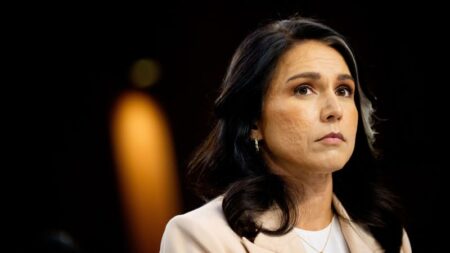Laura Anne Jones, a prominent figure within the Senedd, has made headlines with her recent departure from the Conservative Party to join Reform UK. This unexpected shift was officially announced by party leader Nigel Farage at the Royal Welsh Show held in Llanelwedd. Jones is celebrated as Reform’s first Member of the Senedd and represents the party’s most notable defection within Wales thus far.
The announcement was striking not only for its content but also for its timing. Laura Anne Jones revealed that she could no longer endorse the Conservative policies in her constituency, indicating a deep ideological divide that prompted her decision. Interestingly, as the press conference was taking place, her former party was reportedly unaware of her intentions, illustrating the element of surprise that often accompanies such political transitions.
In contrast, Welsh Conservative leader Darren Millar expressed disappointment over Jones’s decision, noting that her constituents in South Wales East would feel “very let down.” This sentiment underscores the emotional stakes involved in political affiliations, especially for constituents who might feel abandoned by a representative’s sudden change of allegiance.
Recent developments in Welsh politics have amplified the significance of this defection, particularly in light of changing voter sentiments. Polls suggest that Reform UK stands a chance of emerging as the largest party in the upcoming Senedd elections scheduled for May. This follows another notable shift, with former Conservative Welsh Secretary David Jones also transitioning to Reform, indicating a broader trend of disillusionment with the current party alignment.
During her speech at the Royal Welsh Show, Jones articulated her concerns, declaring, “I’ve just suddenly felt that the Conservative Party was unrecognizable to me.” For a member of the Conservative Party for over three decades, this statement carries substantial weight. Jones praised Reform UK for having its ear tuned to the public’s needs and issues, positioning herself as an advocate for a party that she feels is more aligned with her values and the sentiments of the electorate.
Although Laura Anne Jones had been reselected by the Conservatives for the newly established Senedd seat of Sir Fynwy Torfaen, she faced competition from party member Peter Fox for the top position on the party list. However, she dismissed claims that her defection was influenced by concerns about her re-election prospects. In her response to media inquiries, she noted, “I had a fair chance of getting in,” reflecting a sense of confidence regarding her political future.
Farage, recognizing the value of Jones’s extensive experience, commented on her contributions by saying, “She knows how the place works, and that’s very important for us.” Such endorsements can help pave the way for her influence within Reform UK, allowing her to potentially shape the party’s direction and strategies moving forward.
Laura Anne Jones’s political history is notable; she was initially elected to the National Assembly back in 2003, serving a term until 2007. She made a return to the arena in 2020 after the passing of Mohammad Asghar and was subsequently re-elected in the 2021 elections representing South Wales East. Her recent decision, however, has critical implications, reducing the Conservative representation in the Welsh Parliament to just 14 members.
In reaction to Jones’s departure, Darren Millar reiterated the disappointment felt within the ranks of the Conservatives. “Naturally, I’m disappointed by Laura’s decision, and Conservative Party members and voters in South East Wales will feel very let down by her announcement,” he stated. Millar further criticized Reform as a “high tax and high spend party,” reflecting the partisan tensions that such defections often exacerbate.
Moreover, Rhun ap Iorwerth, leader of Plaid Cymru, denounced the defection as a sign of desperation among Conservatives, suggesting that party members are increasingly aware of bleak prospects as they approach the next election. This ripple of anxiety suggests that Jones’s switch may have further-reaching consequences in the political landscape of Wales.
Thus, Laura Anne Jones’s defection from the Conservative Party to Reform is emblematic of a larger narrative within Welsh politics, reflecting shifting loyalties, growing dissatisfaction among members, and the potential for realignment ahead of crucial electoral contests.











